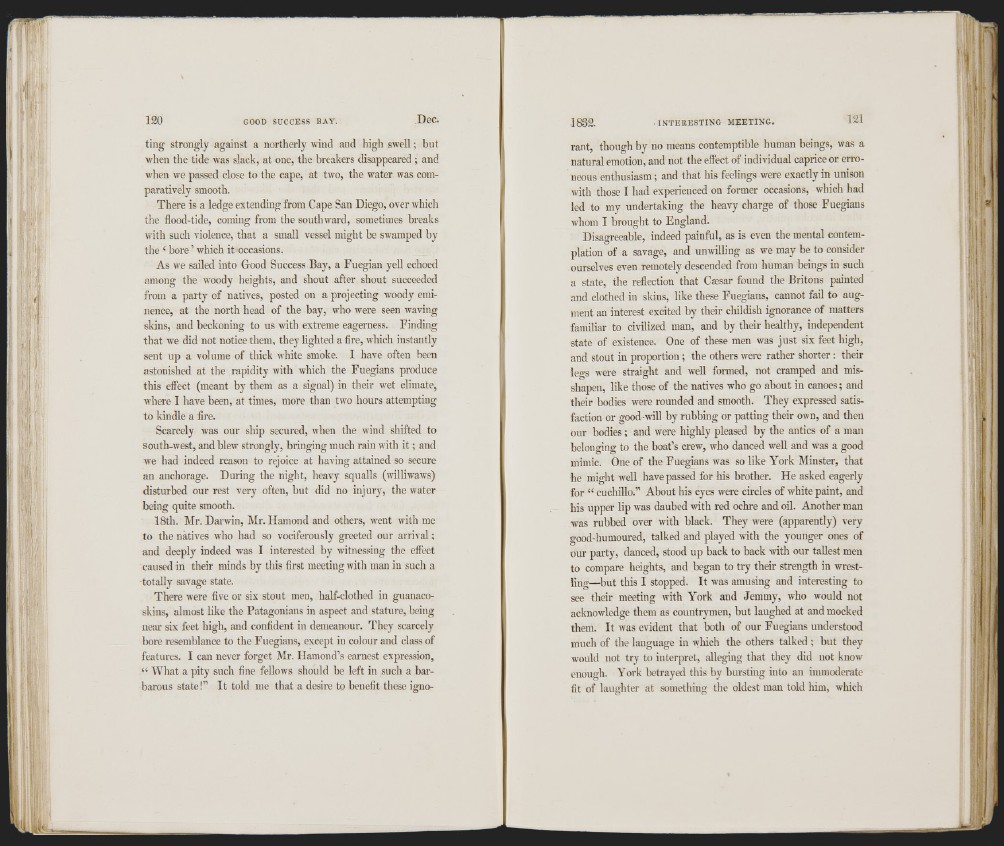
1 f
120 GOOD SUCCESS BAY. Dec.
ting strongly against a northerly wind and high swell; but
when the tide was slack, at one, the breakers disappeared ; and
when we passed close to the cape, at two, the water was comparatively
smooth.
There is a ledge extending from Cape San Diego, over which
the flood-tide, coming from the southward, sometimes breaks
with such violence, that a small vessel might be swamped by
the ‘ bore ’ which it occasions.
As we sailed into Good Success Bay, a Fuegian yell echoed
among the woody heights, and shout after shout succeeded
from a party of natives, posted on a projecting woody eminence,
at the north head of the bay, who were seen waving
skins, and beckoning to us with extreme eagerness. Finding
that we did not notice them, they lighted a fire, which instantly
sent up a volume of thick white smoke. I have often been
astonished at the rapidity with which the Fuegians produce
this effect (meant by them as a signal) in their wet climate,
where I have been, at times, more than two hours attempting
to kindle a fire.
Scarcely was our ship secured, when the wind shifted to
south-west, and blew strongly, bringing much rain with i t ; and
we had indeed reason to rejoice at having attained so secure
an anchorage. During the niglit, heavy squalls (williwaws)
disturbed our rest very often, but did no injury, the water
being quite smooth.
18th. Mr. Darwin, Mr. Hamond and others, went with me
to the natives who had so vociferously greeted our arrival;
and deeply indeed was I interested by witnessing tlie eflect
caused in their minds by this first meeting with man in such a
totally savage state.
There were five or six stout men, half-clothed in guanaco-
skins, almost like the Patagonians in aspect and stature, being-
near six feet high, and confident in demeanour. They scarcely
bore resemblance to the Fuegians, except in colour and class of
features. I can never forget Mr. Hamond’s earnest expression,
“ AVhat a ]iity such fine fellows should be left in such a barbarous
state!” I t told me that a desire to benefit these igno1832.
■ IN T E IIE ST IN G M EET IN G . 121 . r
i I,,
rant, though by no means contemptible human beings, was a
natural emotion, and not the effect of individual caprice or erroneous
enthusiasm ; and that his feelings were exactly in unison
with those I had experienced on former occasions, which had
led to my undertaking the heavy charge of those Fuegians
whom I brought to England.
Disagreeable, indeed painful, as is even the mental contemplation
of a savage, and unwilling as we may be to consider
ourselves even remotely descended from human beings in such
a state, the reflection that Csesar found the Britons painted
and clothed in skins, like these Fuegians, cannot fail to augment
an interest excited by their childish ignorance of matters
familial- to civilized man, and by their healthy, independent
state of existence. One of these men was just six feet high,
and stout in proportion ; the others were rather shorter : their
legs were straight and well formed, not cramped and misshapen,
like those of the natives who go about in canoes; and
their bodies were rounded and smooth. They expressed satisfaction
or good-will by rubbing or patting their own, and then
our bodies ; and were highly pleased by the antics of a man
belonging to the boat’s crew, who danced weU and was a good
mimic. One of the Fuegians was so like York Minster, that
he might well have passed for his brother. He asked eagerly
for “ cuchillo.” About his eyes were circles of white paint, and
his upper lip was daubed with red ochre and oil. Another man
was rubbed over with black. They were (apparently) very
good-humoured, talked and played with the younger ones of
our party, danced, stood up back to back with our tallest men
to compare heights, and began to try their strength in wrestling—
but this I stopped. I t was amusing and interesting to
see their meeting with 'Voi-k and Jemmy, who would not
acknowledge them as countrymen, but laughed at and mocked
them. I t was evident that both of our Fuegians understood
much of the language in which the others talked ; but they
would not try to interpret, alleging that they did not know
enough. York betrayed this by bursting into an immoderate
fit of laughter at something the oldest man told him, which
*!i
iil:l
HI